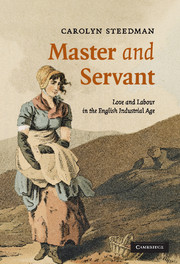Book contents
- Frontmatter
- Contents
- List of maps
- Acknowledgements
- Map 1 Map of the Haworth, Slaithwaite, Huddersfield and Halifax region, 1795
- Map 2 Sketch map of the woollen and worsted producing areas of the West Riding, late eighteenth century
- Prologue
- 1 Introduction: on service and silences
- 2 Wool, worsted and the working class: myths of origin
- 3 Lives and writing
- 4 Labour
- 5 Working for a living
- 6 Teaching
- 7 Relations
- 8 The Gods
- 9 Love
- 10 Nelly's version
- 11 Conclusion: Phoebe in Arcadia
- Bibliography
- Index
6 - Teaching
Published online by Cambridge University Press: 06 January 2010
- Frontmatter
- Contents
- List of maps
- Acknowledgements
- Map 1 Map of the Haworth, Slaithwaite, Huddersfield and Halifax region, 1795
- Map 2 Sketch map of the woollen and worsted producing areas of the West Riding, late eighteenth century
- Prologue
- 1 Introduction: on service and silences
- 2 Wool, worsted and the working class: myths of origin
- 3 Lives and writing
- 4 Labour
- 5 Working for a living
- 6 Teaching
- 7 Relations
- 8 The Gods
- 9 Love
- 10 Nelly's version
- 11 Conclusion: Phoebe in Arcadia
- Bibliography
- Index
Summary
It was held that the first duty of a Protestant church was to instruct the laity. Education – of children in parochial schools rehearsing the catechism, or gathered elsewhere to learn their responses, or of adults in a Sunday congregation attending to a sermon – this was what, in its own estimation, marked the Church of England off from the Roman Catholic Church's expectation of unquestioning, superstitious faith in the laity. John Murgatroyd understood himself, first and foremost, to be a teacher. He wrote extensive and considered accounts of the ministry, and the qualifications of a minister of the church; but when he thought about himself and what he had done through a very long life, he called himself a teacher, in pulpit, schoolroom, and ‘in my Life and conversation’. His duty – always, he wrote, done with very great willingness – was to enable the laity to hear from him consistently (‘with Continuance’) what the Christian story was: ‘ye End of coming into ye world … answered – ye way of Salvation taught’. He thought he had done well enough over the sixty years he had taught in school and pulpit; that his method had reached many sorts of people: ‘my Teaching has been plain & … fit for any capacity – it has come from my Heart & by ye close attention & silence of the Heavens it has appear'd plainly to have powerfully come to their Hearts’.
- Type
- Chapter
- Information
- Master and ServantLove and Labour in the English Industrial Age, pp. 110 - 130Publisher: Cambridge University PressPrint publication year: 2007
- 1
- Cited by



